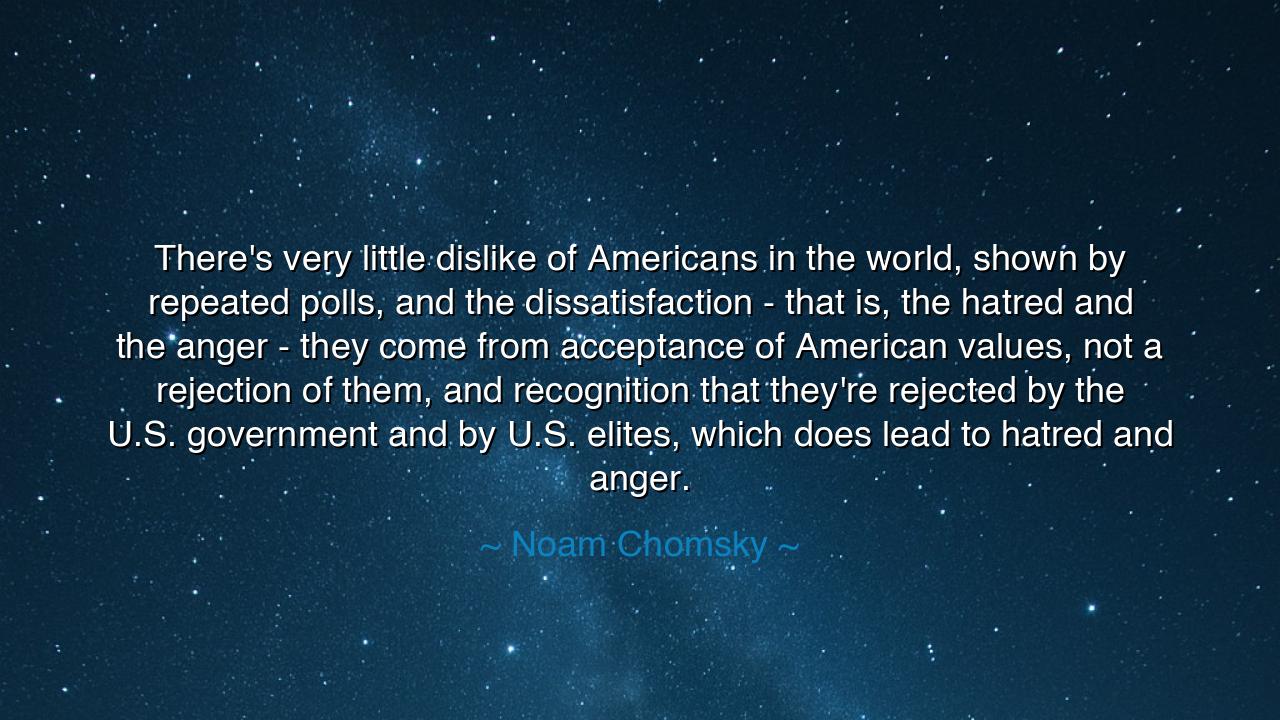
There's very little dislike of Americans in the world, shown by
There's very little dislike of Americans in the world, shown by repeated polls, and the dissatisfaction - that is, the hatred and the anger - they come from acceptance of American values, not a rejection of them, and recognition that they're rejected by the U.S. government and by U.S. elites, which does lead to hatred and anger.






The quiet hum of the café filled the space, the rain outside adding to the reflective mood. Jack sat across from Jeeny, his coffee cup resting in his hands, his gaze distant. Jeeny, sitting opposite him, seemed deep in thought, her fingers tracing the rim of her cup.
Host: After a moment of silence, Jeeny spoke, her voice calm but with an undercurrent of curiosity.
Jeeny: “I came across a quote from Noam Chomsky today that made me think about global perceptions of America. He said, ‘There’s very little dislike of Americans in the world, shown by repeated polls, and the dissatisfaction—that is, the hatred and the anger—they come from acceptance of American values, not a rejection of them, and recognition that they’re rejected by the U.S. government and by U.S. elites, which does lead to hatred and anger.’ What do you think about that? Do you think people’s dissatisfaction with America really comes from this sense of rejection rather than opposition?”
Jack: He looked up, considering her question thoughtfully. “I think Chomsky’s onto something there. It’s not so much that people disagree with American ideals; it’s more that they feel those values are distorted or misapplied by the U.S. government and elites. When you look at American values—freedom, democracy, equality—it’s clear why many people around the world would embrace them. But when those values don’t seem to apply equally within the U.S., or when the actions of the government contradict those ideals, it creates a sense of betrayal. People don’t hate Americans—they’re frustrated because the values they admire are being undermined.”
Jeeny: “Exactly. It’s like people recognize the potential of what America represents, but they also see the discrepancy between that ideal and the reality of U.S. foreign policy or internal politics. The anger and resentment come not from rejecting American values, but from the disillusionment that arises when those values are only selectively applied or ignored by those in power. It’s the recognition that America isn’t living up to the standards it sets for itself.”
Host: The rain outside had softened, and the quiet seemed to deepen between them. Jack shifted slightly in his seat, his fingers still resting on his coffee cup as he continued.
Jack: “I think that’s what makes Chomsky’s point so powerful. When people feel that their admiration for American values is met with disappointment by the actions of the government or its leaders, it creates this complex dynamic. They’re not angry because they oppose America—they’re angry because they believe in the ideals America stands for, but they see those ideals being betrayed. It’s a kind of cognitive dissonance that fuels that frustration.”
Jeeny: “Yes, and it’s also about the disconnect between the people and the elites in power. Chomsky points out that this anger doesn’t come from rejecting American values but from the recognition that those values are being ignored by the very people who should be upholding them. The fact that the U.S. government doesn’t reflect those values to the rest of the world, or even to its own people, creates a sense of disillusionment that can evolve into resentment.”
Host: The conversation seemed to deepen, as if they were both reflecting on how global dissatisfaction with America stems from a complex web of ideals, values, and the reality of political actions. Jack set his cup down gently, his expression thoughtful.
Jack: “In a way, Chomsky’s quote shows us that the frustration isn’t just about policies or actions—it’s about a deeper belief in the possibility of what America could represent. When those ideals aren’t upheld, it leads to this sense of betrayal that can result in real anger. People aren’t rejecting America, they’re reacting to the gap between what America could be and what it sometimes is.”
Jeeny: “Exactly. And that’s why it’s so important to understand that the anger isn’t necessarily about hating America—it’s about feeling that America’s potential is being lost. It’s a kind of mourning for what America could be, if it truly lived up to the values it proclaims.”
Host: The rain had stopped, leaving a quiet calm in its wake. Inside, Jack and Jeeny sat, each reflecting on the complexities of how America is perceived around the world. Chomsky’s words serve as a reminder that dissatisfaction doesn’t always come from rejection; it often comes from the recognition of a disconnect between ideals and actions. It’s not about opposing American values—it’s about wanting to see them fulfilled, and when that doesn’t happen, frustration and anger inevitably follow.






AAdministratorAdministrator
Welcome, honored guests. Please leave a comment, we will respond soon